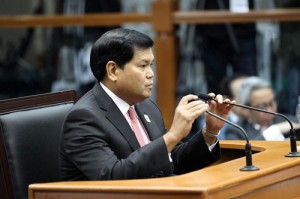By ELLEN TORDESILLAS
AS I was writing this piece, Supreme Court Spokesman Midas Marquez was having a press conference announcing the temporary restraining order that the High Court issued against the Senate, sitting as an impeachment court, to subpoena information on the foreign dollar account of Chief Justice Renato Corona.
As to the petition of Corona to stop the his impeachment trial, no action was done because when it was raffled Wednesday, it went to Associate Justice Presbitero Velasco, who inhibited because his son is a member of the House of Representatives from where the Corona impeachment emanated.
Whatever would be the final decision on the Chief Justice’s dollar account or accounts, Corona is finished.
In last Wednesday’s hearing, PSBank President Pascual Garcia revealed that the five peso accounts of Corona as of Dec. 31, 2010 contained P19,728,555.39.
Yesterday, the manager of the Bank of the Philippines Island, Ayala branch testified that as of Dec. 31, 2010, the balance of Corona’s checking account with them was P12,024,000.67.
What has been revealed in the impeachment court was that as of Dec. 31, 2010, Corona had about P32 million in the bank.
Corona stated in his statement of assets, liabilities and net worth (SALN) for 2010 that he had only P3.5 million in cash and investments.
The huge discrepancy is glaring proof of dishonesty.
There is a side issue on the legality of the sourcing of the bank records of Corona which was the basis of the impeachment court’s subpoena. However this particular issue would be resolved in line with theory of “fruit of the poisoned tree,” the prosecution has scored a victory by showing what seems to be the untruthfulness of Corona.
To the senators-judges, the impression created by this damaging information carries a lot of weight.
We understand the voting by the senator-judges on the issuance of the subpoena for Corona’s bank deposits during a caucus was close. That does not bode well for Corona because if the administration allies were able to get a majority in a closed-door environment, where the senators would not have to worry about a public’s backlash, he is in danger of conviction in the final voting.
No wonder Corona ran to his colleagues in the Court for help. He asked for a TRO, both on the opening of the dollar account and the cessation of the impeachment trial. He got a TRO on the first petition but not on the second.
Lawyer Teddy Te, who follows closely the impeachment proceedings while based in New York, is of the view that Corona is near surrender.
Here’s Teddy Te’s Facebook entry on Feb. 8:
“From a tactical point of view, the Corona petition is almost the white flag–almost. The allegation about ‘grave abuse of discretion’ by another branch of government is, I think, deliberate: to avoid an outright dismissal on the ground that it is a political question. The re-allegation of the insufficiency of the impeachment complaint is also, I think, deliberate: to allow this petition to be consolidated with the other pending petitions to stop the trial and also to confer standing in case the standing of the other petitioners (Lozano, Paguia, Adaza, Millora, et al.) is denied.
“ From a purely academic point of view, however, the Corona petition is a mother lode of ethical and legal issues that would keep every law class occupied. Some interesting questions that the petition raises, for instance:
1. Is it ethical for a sitting Chief Justice to ask for relief from the very Court he leads and from which he has not taken leave?
2. Is it ethical for a sitting Chief Justice to not disclose in his petition that the documents and testimonies subject of his TRO application are NOT YET ADMISSIBLE as they have yet to be formally offered and considered?
3. Is it ethical for a sitting Chief Justice, who should be primus inter pares (first among equals), to ask for inhibition of two of his fellow Justices?
4. Is it ethical for a sitting Chief Justice to treat the public office he holds as his personal “property” such that he should invoke the due process clause (which covers ONLY life, liberty and property)?
5. Is it ethical for a Chief Justice to not say “no” to the petition in light of all of the above?


No comments:
Post a Comment